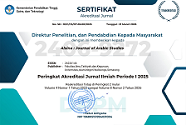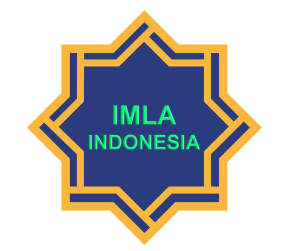Urgensi Filsafat Analitik dalam Penyusunan Bahan Ajar Bahasa Arab Berbasis Nilai Moderasi
DOI:
https://doi.org/10.21580/alsina.5.2.22231Keywords:
Analytic philosophy, Arabic language, moderation values, teaching materialsAbstract
The preparation of Arabic teaching materials based on moderation values has been the focus of this research. The analytic philosophy approach is a foundation for detailing and integrating moderation values into teaching materials. This study aims to identify analytic philosophy's urgency in developing moderation value-based Arabic teaching materials. The analysis method used involves a qualitative approach, which analyzes the content of teaching materials developed using the principles of analytic philosophy. This analysis involves differentiating concepts, language rigor, and understanding cultural contexts. The results showed that analytic philosophy significantly enriched Arabic teaching materials by considering the diversity of students' moderation values. The learning steps applied include careful differentiation of concepts, rigor in the use of language, and continuous reflection and improvement. This research contributes to developing Arabic pedagogy responsive to students' values and culture, creating a framework combining analytic philosophy with moderation values in Arabic teaching approaches.
Downloads
References
Abusyairi, Khairy. “Pengembangan Bahan Ajar Bahasa Arab.” Dinamika Ilmu 13, no. 1 (2013): 51–66. https://doi.org/10.21093/di.v13i1.275.
Alfiani, Elyana Nur. “Pengembangan Handout CEKAP sebagai Bahan Ajar Bahasa Arab untuk Siswa Kelas VI Madrasah Ibtidaiyah.” Alsina: Journal of Arabic Studies 4, no. 2 (2022): 167–88. https://doi.org/10.21580/alsina.4.2.10214.
Aziz, Abdul. “Moderasi Beragama dalam Bahan Ajar Mata Kuliah Pendidikan Agama (PAI) di Perguruan Tinggi Umum Swasta (Studi di STIE Putra Perdana Indonesia Tangerang).” Jurnal Sosial Humaniora 6, no. 2 (2020): 95–117. https://jurnal.untirta.ac.id/index.php/JAWARA/article/view/9778.
Bernstein, Jared. “Theory and Method in Automatic Evaluation of Spoken Language Proficiency.” The Journal of the Acoustical Society of America 120, no. 5 (2006): 3138–3138. https://doi.org/10.1121/1.4787747.
Chaika, Oksana, Inna Savytska, Natalia Sharmanova, and Liudmyla Zakrenytska. “Poly- And/or Multiculturality of Future Teachers in Foreign Language Instruction: Methodological Facet.” WISDOM 20, no. 4 (2021): 126–38. https://doi.org/10.24234/wisdom.v20i4.583.
Dinata, Rahmat Satria, Meliza Budiarti, and Musalwa Musalwa. “Filsafat Analitika Bahasa: Urgensi Filsafat Bahasa dalam Landasan Filosofis Pembelajaran Bahasa Arab.” Jurnal Al-Aqidah 13, no. 2 (2021): 137–45. https://doi.org/10.15548/ja.v13i2.3195.
Ekawati, Dian, and Ahmad Arifin. “Pendekatan dalam Pembelajaran Bahasa Arab: Teori, Konsep, dan Implementasi.” An Nabighoh 24, no. 1 (2022): 111–26. https://doi.org/10.32332/an-nabighoh.v24i1.4818.
Hadiyanto, Andy, Cendra Samitri, and Siti Maria Ulfah. “Model Pembelajaran Bahasa Arab Multiliterasi Berbasis Kearifan Lokal dan Moderasi Islam di Perguruan Tinggi Negeri.” Hayula: Indonesian Journal of Multidisciplinary Islamic Studies 4, no. 1 (2020): 117–40. https://doi.org/10.21009/004.01.07.
Hamid, M Abdul, Danial Hilmi, and M Syaiful Mustofa. “Pengembangan Bahan Ajar Bahasa Arab Berbasis Teori Belajar Konstruktivisme untuk Mahasiswa.” Arabi: Journal of Arabic Studies 4, no. 1 (2019): 100–114. https://doi.org/10.24865/ajas.v4i1.107.
Handayani, Dina, and Zaim. “Urgensi Filsafat Bahasa dalam Pengembangan Kurikulum Pembelajaran Bahasa Berbasis Outcome Based Education.” Jurnal Filsafat Indonesia 6, no. 2 (2023): 213–19. https://doi.org/10.23887/jfi.v6i2.56834.
Hanifah, Umi. “Pentingnya Buku Ajar yang Berkualitas dalam Meningkatkan Efektivitas Pembelajaran Bahasa Arab.” Jurnal At-Tajdid 3, no. 1 (2014): 99–121. http://repository.uinsa.ac.id/id/eprint/2181/.
Herman, M A. “Nilai Moderasi Islam dan Internalisasinya di Sekolah.” INSANIA: Jurnal Pemikiran Alternatif Kependidikan 25, no. 1 (2019): 31–43. https://doi.org/10.24090/insania.v25i1.3365.
Imamah, Anisul, Abdor Rahman Wahid, Manisha Aulia, Dessy Suryawati, and Muhammad Fadli Ramadhan. “Integrasi Filsafat dan Bahasa Arab dalam Pembelajaran Bahasa Arab.” Maharat Lughawiyah: Jurnal Pendidikan Bahasa Arab 1, no. 4 (2022): 285–92. https://doi.org/10.18860/jpba.v1i4.2574.
Kaelan. “Filsafat Analitis Menurut Ludwig Wittgenstein: Relevansinya bagi Pengembangan Pragmatik.” Humaniora 16, no. 2 (2004): 133–46. https://doi.org/10.22146/jh.813.
Kosasih, E. Pengembangan Bahan Ajar. Jakarta: Bumi Aksara, 2021.
Kusstianti, Nia, Sri Dwiyanti, and Sri Usodoningtyas. “Pengembangan Kurikulum Pendidikan Tata Rias berbasis Outcome Based Education (OBE).” Journal of Vocational and Technical Education (JVTE) 4, no. 2 (2022): 1–9. https://doi.org/10.26740/jvte.v4n2.p1-9.
Magdalena, Ina, Tini Sundari, Silvi Nurkamilah, Dinda Ayu Amalia, and Universitas Muhammadiyah Tangerang. “Analisis Bahan Ajar.” Jurnal Pendidikan Dan Ilmu Sosial 2, no. 2 (2020): 311–26. https://ejournal.stitpn.ac.id/index.php/nusantara/article/view/828.
Miswari, Miswari. “Nasib Filsafat di Tangan Bahasa: Evaluasi Kritis Filsafat Analitik, Strukturalisme dan Dekonstruksi.” JL3T (Journal of Linguistics, Literature and Language Teaching) 2, no. 2 (2016): 147–73. https://doi.org/10.32505/jl3t.v2i2.19.
Muhmidayeli, Muhmidayeli. “Filsafat Analitik Kritik Epistemologi Ide Analitik Logis Bertrand Russell.” Jurnal Theologia 25, no. 1 (2014): 121–42. https://doi.org/10.21580/teo.2014.25.1.340.
Nuryasana, Endang, and Noviana Desiningrum. “Pengembangan Bahan Ajar Strategi Belajar Mengajar untuk Meningkatkan Motivasi Belajar Mahasiswa.” Jurnal Inovasi Penelitian 1, no. 5 (2020): 967–74. https://doi.org/10.47492/jip.v1i5.177.
Puzatykh, A.N. “Features of the Philosophy-Based Language Teaching.” Educational Psychology in Polycultural Space 59, no. 3 (2022): 116–23. https://doi.org/10.24888/2073-8439-2022-59-3-116-123.
Rohali, Rohali. “Pengaruh Filsafat Analitik dalam Pendidikan Bahasa Prancis.” Diksi 27, no. 2 (2019): 177–83. https://doi.org/10.21831/diksi.v27i2.23082.
Santoso, Iman. “Perkembangan Filsafat Analitika Bahasa: Dari GE Moore Hingga JL Austin.” Allemania, Jurnal Bahasa dan Sastra Jerman 2, no. 2 (2013): 199–208.
Sari, Milya, and Asmendri Asmendri. “Penelitian Kepustakaan (Library Research) dalam Penelitian Pendidikan IPA.” Natural Science 6, no. 1 (2020): 41–53. https://doi.org/10.15548/nsc.v6i1.1555.
Shahini, G., and A. M. Riazi. “A PBLT Approach to Teaching ESL Speaking, Writing, and Thinking Skills.” ELT Journal 65, no. 2 (2011): 170–79. https://doi.org/10.1093/elt/ccq045.
Sunardi. “Filsafat Analitis Bahasa dan Hubungannya dengan Ilmu Linguistik Pragmatik.” Lite: Jurnal Bahasa, Sastra, dan Budaya 7, no. 2 (2011): 64–83. https://doi.org/10.33633/lite.v7i2.494.
Supelli, Karlina. “Apakah Filsafat Analitik?” Driyarkara 32, no. 1 (2011): 1–30. http://repo.driyarkara.ac.id/481/.
Syaifullah, Muhammad, and Nailul Izzah. “Kajian Teoritis Pengembangan Bahan Ajar Bahasa Arab.” Arabiyatuna : Jurnal Bahasa Arab 3, no. 1 (2019): 127. https://doi.org/10.29240/jba.v3i1.764.
Syairi, Khairi Abu. “Pengembangan Bahan Ajar Bahasa Arab.” Dinamika Ilmu 13, no. 1 (2013). https://doi.org/10.21093/DI.V13I1.275.
Taembo, Maulid, and Tri Pujiati. “Filsafat Analitik Bahasa dalam Perkembangan Ilmu Bahasa.” Journal of Social, Culture, and Language 1, no. 2 (2023): 10–17. https://doi.org/10.21107/jscl.v1i2.22582.
Tamaji, Sampiril Taurus. “Pembelajaran Bahasa Arab dalam Perspektif Filsafat Ilmu.” Al-Fakkaar: Jurnal Ilmiah Pendidikan Bahasa Arab 1, no. 2 (2020): 80. https://e-jurnal.unisda.ac.id/index.php/ALF/article/view/2049.
Tricahyo, Agus. “Landasan Filosofis Kebijakan Pengembangan Kurikulum Bahasa Arab.” CENDEKIA 11, no. 1 (2013): 57–74. https://doi.org/10.21154/cendekia.v11i1.727.
Winarsih, Elis, Catur Wibowo, and Cecep E Rustana. “Desain Bahan Ajar Hukum Newton Berbasis Wix Website untuk Melatih Keterampilan Argumentasi Siswa SMA.” Prosiding Seminar Nasional Fisika 10 (2022): 97–104. https://doi.org/10.21009/03.SNF2022.
Zain, Muhamad. “Pengembangan Strategi Pembelajaran dan Pemilihan Bahan Ajar.” Jurnal Inspiratif Pendidikan (JIP) 6, no. 1 (2017): 172–78. https://doi.org/10.24252/ip.v6i1.4925.
Downloads
Published
How to Cite
Issue
Section
License
Copyright
The copyright of the received article shall be assigned to the publisher of the journal. The intended copyright includes the right to publish the article in various forms (including reprints). The journal maintains the publishing rights to published articles. Authors are allowed to use their articles for any legal purposes deemed necessary without written permission from the journal, but with an acknowledgment to this journal of initial publication.
Licensing
In order for Alsina: Journal of Arabic Studies to publish and distribute research articles, the editors need publishing rights (transferred from author to publisher). This agreement relates to the transfer/publishing copyright license to Alsina: Journal of Arabic Studies but the authors still have significant rights to use and share their published articles.
Alsina: Journal of Arabic Studies supports the need for writers to share, disseminate and maximize the impact of their research and their rights on any database. As a journal article writer, you have the right to various uses of your articles, including that by the institution or company where you work. Copyright can be used without the need for special permission. Authors who publish articles in the Alsina: Journal of Arabic Studies have broad rights to use their work for teaching and scientific purposes without requesting permission, including:
- Use by the author for lectures, presentations, or conferences, with distribution of copies to participants;
- Distribution to colleagues for research use;
- Use in compilations of the author's subsequent work;
- inclusion in a thesis or dissertation;
- Reuse of sections or excerpts from articles in other works (with full acknowledgment of the final article);
- Preparation of derivative works (other than commercial purposes) (with full acknowledgment of the final article);
- Voluntary posting on open websites operated by authors’ or writers' agencies for scientific purposes
When submitting a manuscript, authors do so on the understanding that if accepted for publication, the copyright for publishing (publishing right) of the article shall be assigned/transferred to Alsina: Journal of Arabic Studies.
Authors whose articles are accepted for publication will receive confirmation via email and sent a Copyright Transfer Agreement.


 Accreditation
Accreditation 
 In Collaboration with
In Collaboration with 

 Visitors
Visitors  Article Template
Article Template





